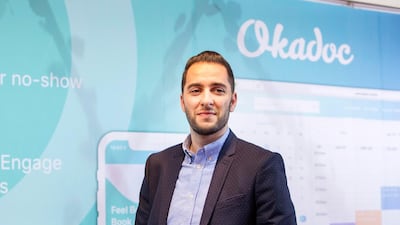UAE-based start-up Okadoc raised $10 million (Dh36.7m) in its latest funding round from institutional and private investors to finance plans to launch tele-medicine services and expand its footprint across the Gulf.
The health-tech firm's Series A round of financing received backing from Abu Dhabi Investment Office (Adio) and Ithmar Capital Partners, Okadoc said in a statement on Wednesday.
"The fund-raising is for expansion. We are launching tele-medicine and expanding in the region," Fodhil Benturquia, founder and chief executive of Okadoc, said.
Healthcare providers in the Gulf are expanding as the population increases and the cost of treatment edges higher. Expected improvements in the quality of healthcare provision, together with rising demand for preventive care and digital medical services are set to drive growth in the industry.
Medical search portal Okadoc, which previously raised $2.3m in a seed round in 2018, is planning to expand its operations to Saudi Arabia this year, starting with Riyadh and Jeddah, before targeting other cities.
"We are going very big in Saudi Arabia, we are talking to large healthcare providers and smaller clinics," Mr Benturquia said. "Our plan is quite aggressive there. It’s a very big market."
Other Gulf countries are also within Okadoc's sights, he said, declining to disclose details. The start-up already has operations in the UAE and Indonesia.
Okadoc will also invest in providing tele-medicine, a service that will allow patients to access virtual consultations with their doctors remotely, in the UAE from this year.
"What we are seeing through data and talking to our customers is that there's a lot of questions: In which case should I see a doctor? Sometimes they want to talk to a doctor for a symptom check or to see if the case is serious or not," he said. "There's a big need for assessments, follow-ups, seeking a second opinion."
The service is aimed at underserved populations with limited access to healthcare.
It would help improve access to doctors for UAE patients living in the northern emirates, where a wider range of medical specialities is harder to find, according to Mr Benturquia.
It would also serve patients in Indonesia, where the ratio of doctors per capita is among the lowest in the world, reducing waiting times for those in remote rural areas or those in the traffic-clogged capital Jakarta, he said.
Okadoc, which has a team of 30 employees in Indonesia, is undertaking safety precautions in the country where cases of the deadly coronavirus have been detected.
It is advising staff to work from home and circulating the WHO's recommendations on health and safety measures.
The platform has not seen a spike in doctor bookings following the spread of coronavirus, Mr Benturquia said.
Okadoc - which was founded in 2018 to help patients book doctor appointments instantly -says its platform helps doctors, clinics, and hospitals reduce 'no-shows', improve the booking process, reduce administrative costs, increase operational efficiency and attract new patients.
The service, which is free for patients, helps users find a doctor as per the insurance network, location, speciality, the language they speak, or gender. Patients can then view doctors' availability in real-time, instantly book appointments, receive reminders, reschedule, cancel or even request earlier availability.
How the UAE gratuity payment is calculated now
Employees leaving an organisation are entitled to an end-of-service gratuity after completing at least one year of service.
The tenure is calculated on the number of days worked and does not include lengthy leave periods, such as a sabbatical. If you have worked for a company between one and five years, you are paid 21 days of pay based on your final basic salary. After five years, however, you are entitled to 30 days of pay. The total lump sum you receive is based on the duration of your employment.
1. For those who have worked between one and five years, on a basic salary of Dh10,000 (calculation based on 30 days):
a. Dh10,000 ÷ 30 = Dh333.33. Your daily wage is Dh333.33
b. Dh333.33 x 21 = Dh7,000. So 21 days salary equates to Dh7,000 in gratuity entitlement for each year of service. Multiply this figure for every year of service up to five years.
2. For those who have worked more than five years
c. 333.33 x 30 = Dh10,000. So 30 days’ salary is Dh10,000 in gratuity entitlement for each year of service.
Note: The maximum figure cannot exceed two years total salary figure.
Thank You for Banking with Us
Director: Laila Abbas
Starring: Yasmine Al Massri, Clara Khoury, Kamel El Basha, Ashraf Barhoum
Rating: 4/5
Votes
Total votes: 1.8 million
Ashraf Ghani: 923,592 votes
Abdullah Abdullah: 720,841 votes
COMPANY%20PROFILE
%3Cp%3E%3Cstrong%3ECompany%20name%3A%3C%2Fstrong%3E%20Alaan%3Cbr%3E%3Cstrong%3EStarted%3A%3C%2Fstrong%3E%202021%3Cbr%3E%3Cstrong%3EBased%3A%3C%2Fstrong%3E%20Dubai%3Cbr%3E%3Cstrong%3EFounders%3A%3C%2Fstrong%3E%20Parthi%20Duraisamy%20and%20Karun%20Kurien%3Cbr%3E%3Cstrong%3ESector%3A%3C%2Fstrong%3E%20FinTech%3Cbr%3E%3Cstrong%3EInvestment%20stage%3A%3C%2Fstrong%3E%20%247%20million%20raised%20in%20total%20%E2%80%94%20%242.5%20million%20in%20a%20seed%20round%20and%20%244.5%20million%20in%20a%20pre-series%20A%20round%3Cbr%3E%3Cbr%3E%3C%2Fp%3E%0A
Confirmed%20bouts%20(more%20to%20be%20added)
%3Cp%3ECory%20Sandhagen%20v%20Umar%20Nurmagomedov%0D%3Cbr%3ENick%20Diaz%20v%20Vicente%20Luque%0D%3Cbr%3EMichael%20Chiesa%20v%20Tony%20Ferguson%0D%3Cbr%3EDeiveson%20Figueiredo%20v%20Marlon%20Vera%0D%3Cbr%3EMackenzie%20Dern%20v%20Loopy%20Godinez%0D%3Cbr%3E%3C%2Fp%3E%0A%3Cp%3ETickets%20for%20the%20August%203%20Fight%20Night%2C%20held%20in%20partnership%20with%20the%20Department%20of%20Culture%20and%20Tourism%20Abu%20Dhabi%2C%20went%20on%20sale%20earlier%20this%20month%2C%20through%20www.etihadarena.ae%20and%20www.ticketmaster.ae.%0D%3Cbr%3E%3C%2Fp%3E%0A
The specs
Engine: 3.5-litre V6
Power: 272hp at 6,400rpm
Torque: 331Nm from 5,000rpm
Transmission: 8-speed auto
Fuel consumption: 9.7L/100km
On sale: now
Price: Dh149,000
UAE currency: the story behind the money in your pockets
Masters%20of%20the%20Air
%3Cp%3E%3Cstrong%3EDirectors%3A%3C%2Fstrong%3E%20Cary%20Joji%20Fukunaga%2C%20Dee%20Rees%2C%20Anna%20Boden%2C%20Ryan%20Fleck%2C%20Tim%20Van%20Patten%3C%2Fp%3E%0A%3Cp%3E%3Cstrong%3EStarring%3A%3C%2Fstrong%3E%20Austin%20Butler%2C%20Callum%20Turner%2C%20Anthony%20Boyle%2C%20Barry%20Keoghan%2C%20Sawyer%20Spielberg%3C%2Fp%3E%0A%3Cp%3E%3Cstrong%3ERating%3A%3C%2Fstrong%3E%202%2F5%3C%2Fp%3E%0A
More from Neighbourhood Watch
More from Neighbourhood Watch:
Killing of Qassem Suleimani
Read more from Aya Iskandarani
Match info
Uefa Champions League Group B
Barcelona v Tottenham Hotspur, midnight
Spider-Man%202
%3Cp%3E%3Cstrong%3EDeveloper%3A%3C%2Fstrong%3E%20Insomniac%20Games%0D%3Cbr%3E%3Cstrong%3EPublisher%3A%3C%2Fstrong%3E%20%20Sony%20Interactive%20Entertainment%0D%3Cbr%3E%3Cstrong%3EConsole%3A%20%3C%2Fstrong%3EPlayStation%205%0D%3Cbr%3E%3Cstrong%3ERating%3A%3C%2Fstrong%3E%205%2F5%3C%2Fp%3E%0A
Sole survivors
- Cecelia Crocker was on board Northwest Airlines Flight 255 in 1987 when it crashed in Detroit, killing 154 people, including her parents and brother. The plane had hit a light pole on take off
- George Lamson Jr, from Minnesota, was on a Galaxy Airlines flight that crashed in Reno in 1985, killing 68 people. His entire seat was launched out of the plane
- Bahia Bakari, then 12, survived when a Yemenia Airways flight crashed near the Comoros in 2009, killing 152. She was found clinging to wreckage after floating in the ocean for 13 hours.
- Jim Polehinke was the co-pilot and sole survivor of a 2006 Comair flight that crashed in Lexington, Kentucky, killing 49.


